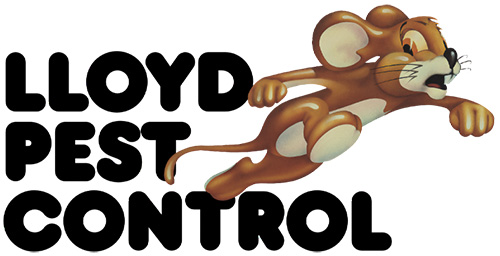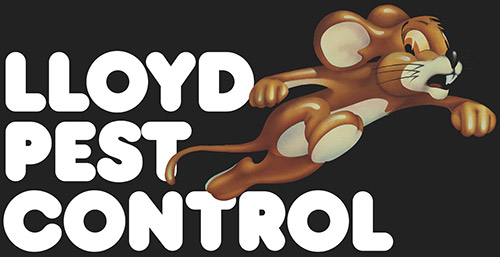How To Get Rid of Fleas and Prevent Typhus Disease
Flea Control and Extermination Articles
In Southern California, flea outbreaks have recently spread a deadly disease known as flea-borne murine typhus—and experts believe it’s due to the worsening conditions within growing homeless populations.
With conducive habitats, booming rat populations, and plenty of potential hosts, flea-borne typhus outbreaks are on the rise throughout urban areas in Los Angeles and Orange County—which means that fleas aren’t an issue we can simply ignore.
To better understand how you can get rid of fleas and prevent disease, it’s best to learn about the origins of flea-borne typhus and what you can do to make your surroundings less attractive to these blood-sucking parasites:
What Is Flea-Borne Murine Typhus?
Not to be confused with typhoid fever (caused by Salmonella Typhi bacteria and spread via contaminated food and water) or epidemic typhus (caused by Rickettsia prowazekii and transmitted via body lice), flea-borne murine typhus is caused by Rickettsia typhi or Rickettsia felis bacteria and is spread by fleas infected from biting sick rats, mice, opossums, feral cats, or homeless dogs.
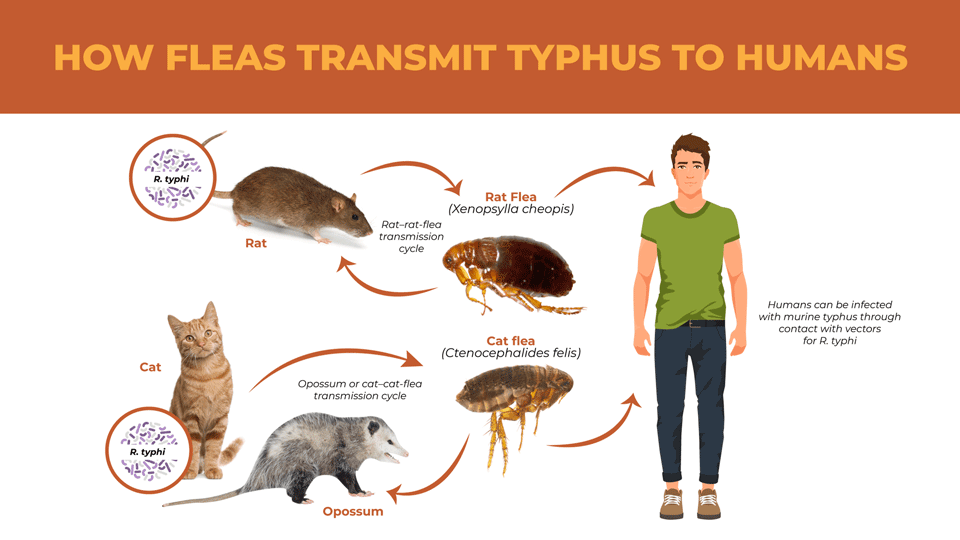
How Do Fleas Transmit Typhus to Humans?
This disease occurs in humans when either 1) a bacteria-laden flea latches onto a host (aka you) to feed on their blood, 2) infectious flea fecal matter (known as “flea dirt”) gets rubbed into wounds in the skin or mucous membranes (aka your eyes), or 3) flea dirt is breathed in.
Even worse, infected fleas tend to defecate while biting you, creating a streamlined source for the disease to enter your body.
Symptoms of Murine Typhus
One to two weeks after being bitten, an infected host can expect a rapidly ensuing fever, headache, chills, muscle aches, abdominal pain, or vomiting that typically last a few days.
Additionally, maculopapular rashes—rashes that contain both flat and raised skin lesions— may occur. Typhus that’s left untreated can lead to severe complications with your major organs, including your:
- Kidneys
- Liver
- Lungs
- Eyes
- Heart
- Brain
Murine Typhus Treatment
While no vaccination exists to prevent flea-borne murine typhus, doctors can treat those who are infected with the antibiotic doxycycline soon after symptoms begin.
Filth and Clutter Attracts Rats and Fleas
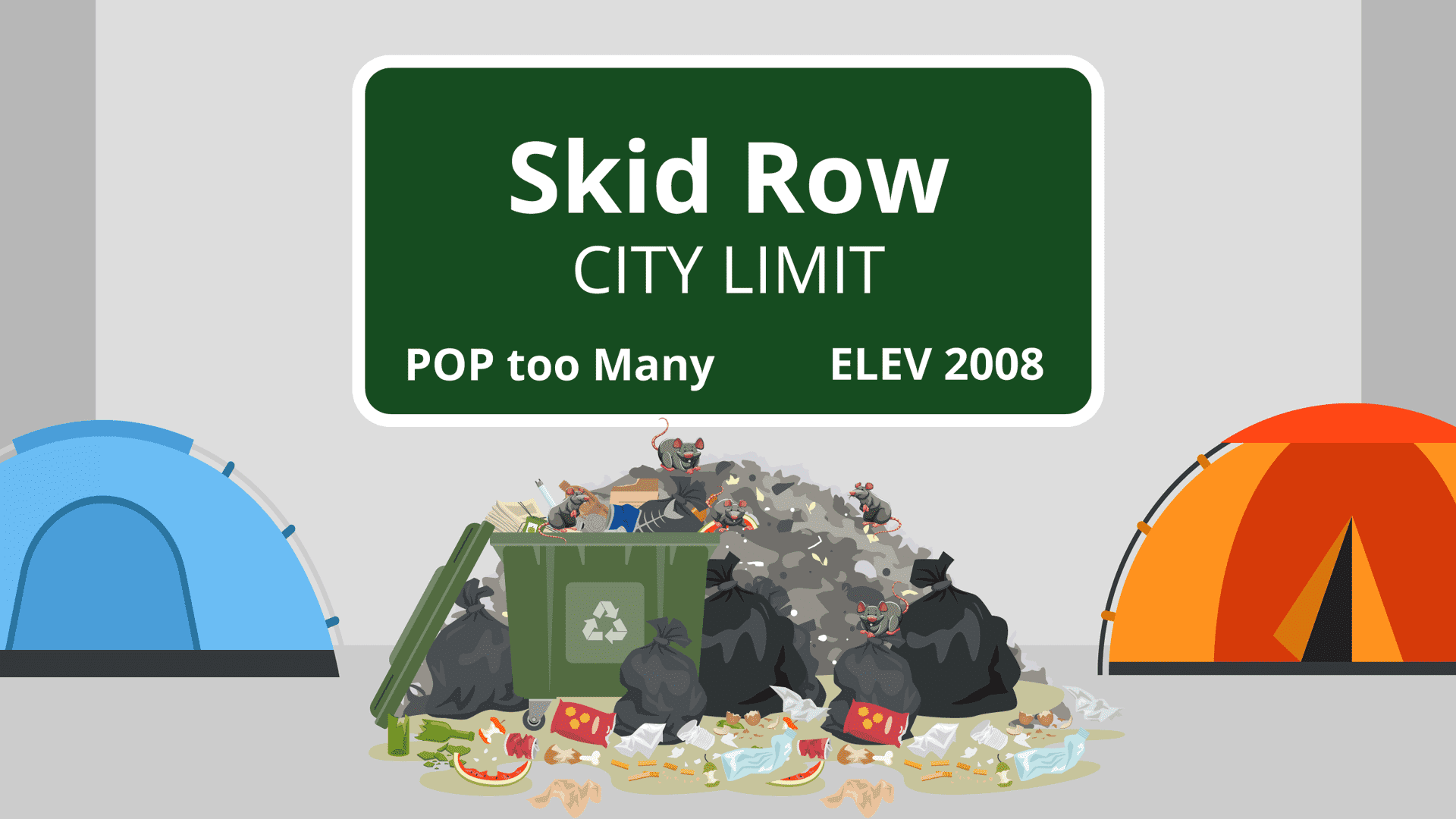
While fleas can contract typhus from various animals, extensive rat populations in the city are becoming a primary source of flea-borne murine typhus.
The rat population has been exploding in homeless encampments due to unsanitary conditions, an exorbitant amount of trash improperly disposed of, and the elimination of rodent control methods under legislation such as AB 1788.
Even city hall officials have felt the impact of a typhus outbreak from rat infestations, causing staff to tear out rat-contaminated office carpet that led to sick employees.
“California is being overrun by rodents—and without immediate emergency action by state and local government, we face significant economic costs and risk a public health crisis,” said Carl DeMaio, chairman of Reform California, at a news conference at city hall where he discussed his group’s recent report on rats becoming a public health crisis in more ways than one.
Stopping Fleas to Prevent Disease
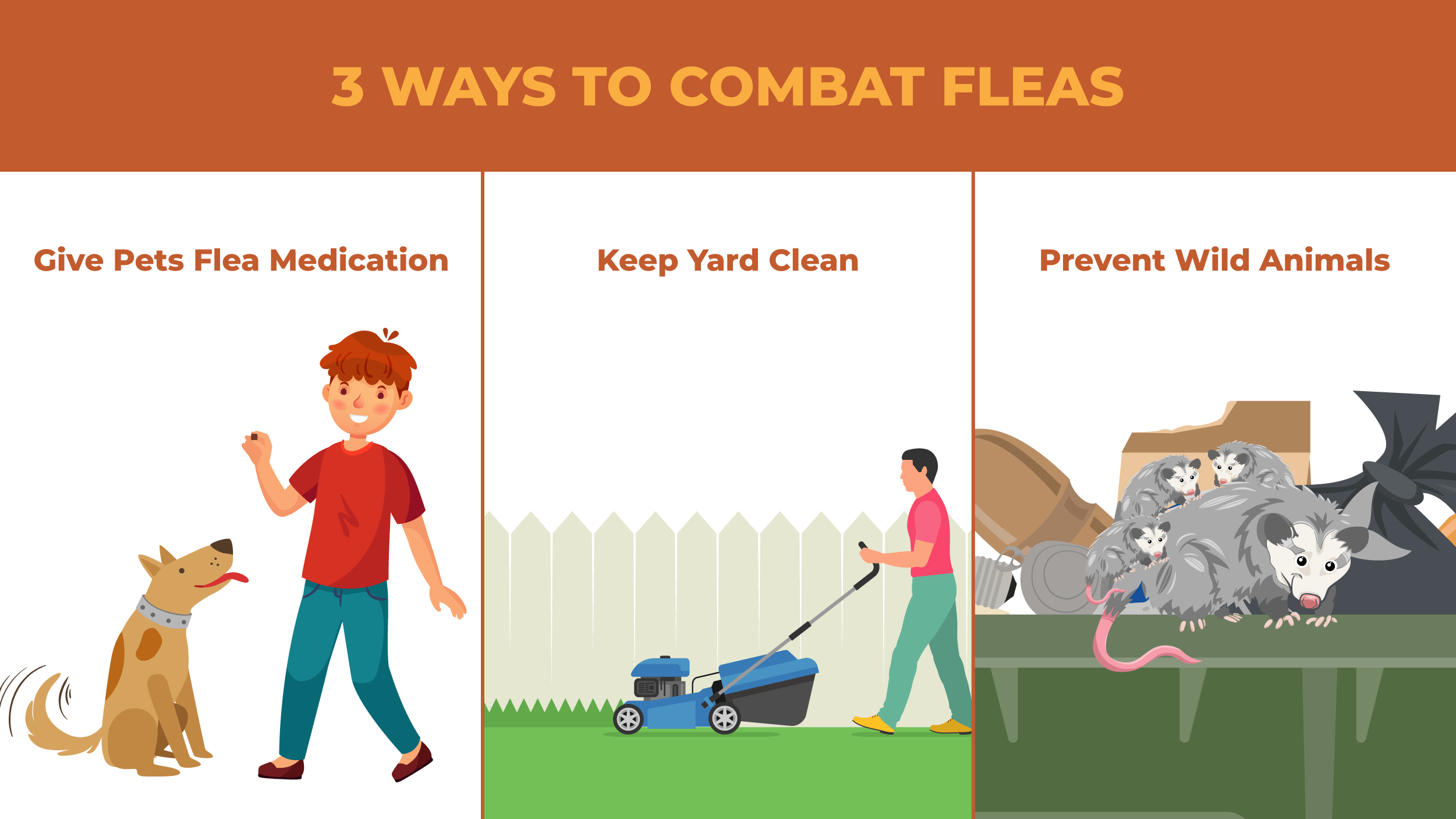
While controlling the city-wide issue of unsanitary homeless encampments and rat infestations might be a challenge, keeping you, your family, and your pets safe from fleas only takes a few simple preventative measures:
Administer Flea Medications to Your Pets
To stop fleas from harming you or your pets’ health, the first (and most important) thing to do is keep up to date on your pets’ flea treatments. Utilize veterinarian-approved medications for both cats and dogs, including flea collars, oral medications, or topical treatments.
It’s almost inevitable that you’ll have a flea issue otherwise, as your pets are susceptible to these pests no matter where they go.
Eliminate Yard Waste and Debris
Fleas flock to landscaping with plenty of moisture and safe places to live, so make sure to remove leaf litter, rock piles, cords of firewood, and other debris from your yard. Also, make sure to keep your grass and hedges trimmed short to prevent any additional flea breeding grounds.
The less flea-friendly your yard is, the less likely your pet will encounter them at home.
Keep Wild Animals Away from Your Home
Finally, keep feral cats, opossums, and rodents—and any traces of them—far away from you and your home.
Don’t pet or feed wild animals near your house, in the park, or out on a hike, regardless of how cute they may seem. At home, ensure all your trash cans, recycle bins, or compost bins have lids that are always sealed tight, and store all food—including your pet’s food—in air-tight containers to avoid attracting hungry animals.
Our Flea Control: Preventing Fleas from Coming Back
Fleas are tough buggers to combat. In fact, they’re the second-most difficult pest to eradicate behind bed bugs, considering their fast reproduction, hardiness, and ability to hide in furniture and carpet fibers.
That’s why, at Lloyd Pest Control, we ward off these tiny disease-spreaders with low-intensity pest barriers outdoors and spot treatments indoors. No matter where fleas are lurking in your home or what life cycle stage they’re in, our team will target their colonies at the source with treatments that are safe for both you and your pets.
Additionally, if you’re dealing with rats or mice, we provide comprehensive rodent control through thorough inspections, exclusion recommendations, and the use of advanced traps and baits.
Contact us today for flea control that goes above and beyond most—and keeps the health of you, your family, and your pets in check.
